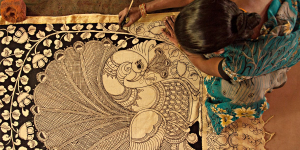Photo credit: https://www.dsource.in/resource/kalamkari-work-srikalahasti/making-process/painting
This track explores the complexity of religion through arts, aesthetics, and ethics across disciplinary boundaries. Going beyond European and American monotheisms and modernities, projects in this track open up understandings of religion and culture, questioning dichotomies such as theory and practice, mind and body, idea and materiality. Coursework and dissertations focus on “lived religion,” often in the contemporary world, but projects that engage with texts or artifacts of past eras are also encouraged. Some areas of study are the aesthetics of religion, gender, ethics in everyday life, race, and the felt experience of religion in visual, digital or literary and performative arts, material culture, or bodily practices. Projects may focus on any period or geographical area that correspond to the expertise and interests of faculty. Methods of study draw on ethnography and material analysis, phenomenology, critical theory, and history.
Convener: Joseph Winters
Major Field Requirements
- Course Work
- 3 advanced courses per semester for at least 2 years
- Students should select classes in a way that prevents more than 2 major research papers in any semester
- With modernity as the primary problematic for their coursework and research, students are asked to situate their inquiries by identifying or adopting at least 1 of the following categories:
- Religions (e.g., Islamic, Hindu, Christian, Buddhist, Jewish, Taoist, etc., including derivative or counter movements)
- Methods (e.g., historical, philosophical, cultural studies, performance studies, literary studies, theological studies, political theory, etc.)
- Issues (authority, gender, race, communications, class, poverty, etc.)
- Locations/Cultures (e.g., the Americas, Muslim societies, various "empires," South Asian cultures, etc.)
- All in-coming students must take a graduate course dedicated to "Religion & Modernity” in the first year of their coursework
- 3 advanced courses per semester for at least 2 years
- Languages
- Must demonstrate by examination, a reading knowledge of 2 languages beyond English and a language of native competence. The choice of these languages will depend on the focus of the student's work. Otherwise, students will demonstrate reading competence in French and German.
- Responsible Conduct of Research Training
- 12 hours of RCR training in first 4 years of study
- Preliminary Examinations
- 4-hour major field exam. Some of the readings for this exam will be drawn from the general bibliography in Religion & Modernity
- 3-hour dissertation-area exam
- 3-hour internal minor exam
- 3-hour external minor exam
- 2-hour oral exam based on all written preliminary exams
- Dissertation
Inside Minor Requirements
- 2 courses
Religion and Modernity
Grazina Bielousova: "The Making of Savage Europe: Religious Difference and the Idea of Eastern Europe." 2022. Co-Advisors: J. Kameron Carter and Joseph Winters.
Torang Asadi: "Quantum Regimes: Genealogies of Virtual Matter and Healing the New Age Body." 2021. Advisor: David Morgan
Yael Lazar: "Networked Devotion: Hindu Adoption of Digital Media." 2018. Advisor: Leela Prasad
Alex McKinley: "Mountain at a Center of the World." 2018. Advisor: Leela Prasad
Zaid Adhami: "Faith with Doubt: American Muslims, Secularity, and the 'Crisis of Faith.'" 2017. Advisor: Leela Prasad
Eric Chalfant: Practicing Disbelief: Atheist Media in America from the Nineteenth Century to Today." 2016. Advisor: David Morgan
Jennifer Kryszak: “Imaging Church: Visual Practices, Ecclesiology, and the Ministry of Art.” 2014. Advisor: Mary McClintock Fulkerson
Joseph Tucker-Edmonds: “Wayward Christians, Wordly Scriptures: Disarticulating Christianities in the Atlantic Public Sphere.” 2013. Advisor: Mary McClintock Fulkerson










